|
|
|
Sort Order |
|
|
|
Items / Page
|
|
|
|
|
|
|
| Srl | Item |
| 1 |
ID:
091172
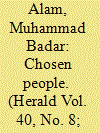

|
|
|
| 2 |
ID:
186580
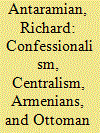

|
|
|
|
|
| Summary/Abstract |
This article argues that non-Muslim engagement with 19th-century Ottoman reform should be understood in the context of a confessionalized politics that originally fostered partnerships of governance in the 18th century. The confessionalization of non-Muslim communities in the 18th century, which resulted in the political empowerment of Istanbul-based ethnarchs, promoted the establishment of robust communal boundaries that were more legible to the central state. These arrangements also made non-Muslim communities such as the Armenians partners in governance, responsible for supporting the state's effort to maintain its place atop a contentious imperial politics. The Tanzimat reforms, which reorganized non-Muslim communities and devolved some power from the clergy to the laity, were not a novelty, but instead a renegotiation of non-Muslims’ roles in the centralization of state. Rather than embrace secularized identities, non-Muslims enthusiastically used their own religious institutions to promote state centralization. In the process, they reconfigured relations of power in the region that left non-Muslims structurally marginalized.
|
|
|
|
|
|
|
|
|
|
|
|
|
|
|
|
| 3 |
ID:
186579
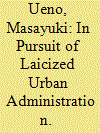

|
|
|
|
|
| Summary/Abstract |
The Ottoman Empire introduced the muhtar system in Istanbul in 1829, appointing lay headmen, called muhtar, to the lowest levels of urban administration: Muslim neighborhoods; Orthodox, Armenian, and Catholic parishes; and Jewish congregations. This reform resulted in the overlapping of state responsibilities and those of non-Muslim religious authorities, later leading to disputes between the groups. This article investigates such disagreements in an effort to understand how state officials perceived non-Muslim religious authorities’ participation in imperial governance. In so doing, this article argues that, as non-Muslim political movements began developing during the late nineteenth century, state officials adopted a cautious attitude toward non-Muslim clergy, viewing the latter as requiring more careful handling than the layman. This take on clergymen was a shift, a reconsideration of the exceptional treatment they had previously enjoyed, and ignited a growing desire to sever the ties, formerly tolerated, between muhtars and religious authorities.
|
|
|
|
|
|
|
|
|
|
|
|
|
|
|
|
| 4 |
ID:
158337
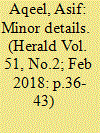

|
|
|
| 5 |
ID:
170475
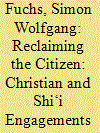

|
|
|
|
|
| Summary/Abstract |
At first glance, Christians and Shi‘is occupy starkly differing socio-economic and religious positions in Pakistani society. Yet, this article argues that both communities share some remarkable similarities in their engagement with the seemingly hostile Pakistani state. Both Christians and Shi‘is have not given up on claiming their stakes as full citizens of the nation despite repeated attempts by parts of the majority population to ostracise and exclude them. I show how they continue to re-read the early history of Pakistan, attempt to prove their unwavering loyalty to the state, try to build bridges with the majority community and, finally, portray themselves as being a spiritual elite that still guarantees the initial promise of Pakistan.
|
|
|
|
|
|
|
|
|
|
|
|
|
|
|
|
| 6 |
ID:
154346
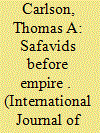

|
|
|
|
|
| Summary/Abstract |
Armenian sources from the 15th century provide distinctive viewpoints on the history of the Safaviyyih Sufi order before the foundation of the Safavid Empire. The history of T‘ovma of Metsop‘ suggests an earlier intermediate step in the militarization of the order, which scholars have typically viewed as an unprecedented development beginning after 1447, and ascribes to the Safavi shaykh the idea of taxing non-Muslims to encourage conversion to Islam. A second Armenian text, a previously unknown colophon, describes Haydar's attack on Shirvan in 1488 and the suffering of the Muslim and Christian sedentary population, as well as an episode of interreligious mockery. It is probably the earliest extant source to identify the Qizilbash by their distinctive red hats. Together, these sources suggest ways in which the Safaviyyih order's development was conditioned by the multireligious environment. They are examples of the value of non-Muslim sources even for late medieval Islamic history.
|
|
|
|
|
|
|
|
|
|
|
|
|
|
|
|
| 7 |
ID:
152360
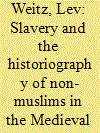

|
|
|
|
|
| Summary/Abstract |
The study of non-Muslims in Islamic societies has long been a robust subfield in the historiography of the medieval Middle East. But its literature has blind spots, a significant example of which concerns slavery as a constitutive institution of non-Muslim communities. Much recent scholarship on medieval non-Muslims has tended to privilege religious affiliation as an explanatory category of social experience, leaving other legal statuses and modes of identification—especially slavery—underanalyzed. This piece will survey this historiographical hole. It will then offer a brief analysis of some Abbasid-era Syriac Christian material in which slavery figures prominently, concubines and concubinage in particular. My goal is to provide an example of how attending to the place of slavery in non-Muslim communities facilitates a much-needed historiographical shift of focus from reified religious identities to the social practices, institutions, and hierarchies upon which those communities were built.
|
|
|
|
|
|
|
|
|
|
|
|
|
|
|
|
|
|
|
|
|